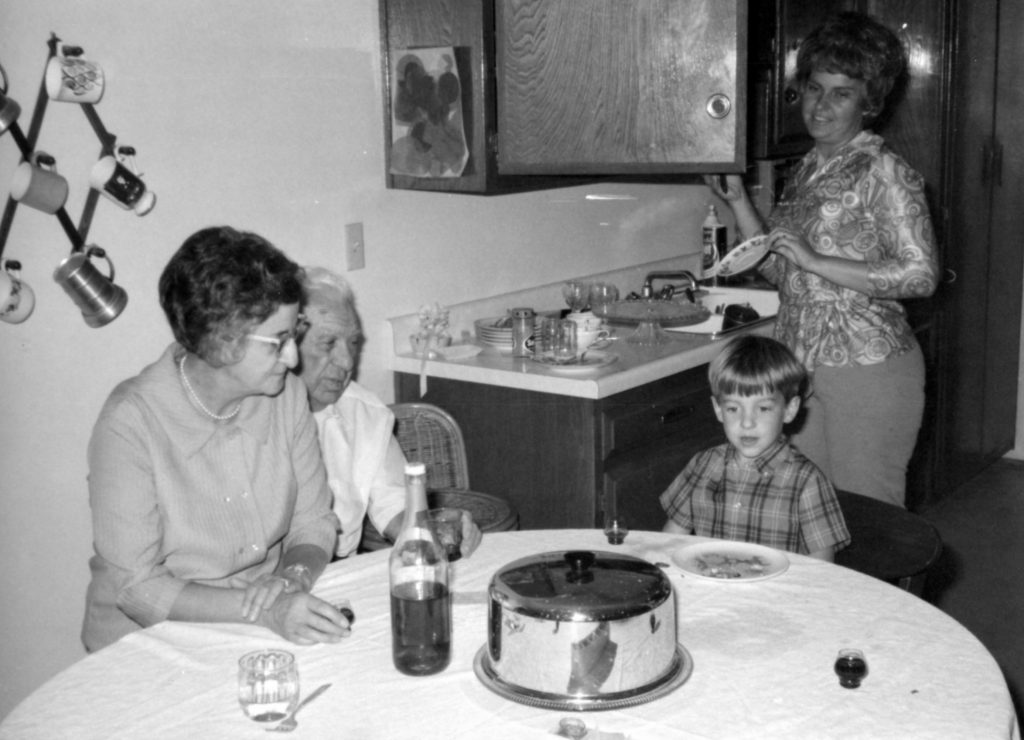Me. Notebook. Keds. Grandma and ‘Pa’s Patio. San Clemente, CA. Circa 1971.
I never tired of hearing my grandmother’s story of her courtship and marriage to my grandfather. He really put the rush on me, she’d say. The clerk spelled a name wrong on our marriage license and we had to go back and get it fixed. I borrowed my sister’s wedding gown. I got a bloody nose.
It’s been 30 years or so since she last told that tale, but I can still hear her voice when I recall the story. As a young girl, I fell for the romance of a three-month courtship–and the image of my grandfather as an ardent suitor made me giggle. These days, I recognize it as the headwaters of my family. It’s a treasure.
I think we’d all like to give our grandchildren treasure. Stories about ourselves are, in an important way, stories about themselves. You don’t have to be a master storyteller to offer them pure gold. Tell a story. It isn’t hard.
A few suggestions:
- Stick to your story. Every generation faces its own special set of hardships (and its own special privileges, too, but we don’t dwell on that point enough). If you want to captivate them, skip the comparisons that insinuate that they’re coddled or spoiled or have it so much easier than you did. Just tell them your story.
- Focus on details. If you’re talking about making strawberry jam or putting up pickles, describe the smells and sounds of the kitchen. If you’re talking about learning to drive a car with a manual transmission, don’t skip over the inevitable bucking starts and stalls at the green light–they’re part of the fun.
- Tell them how you felt. That time you were accidentally locked in the garage overnight, were you afraid? Nervous? Bemused? Share that dimension of the experience. It’s a big chunk of what makes it your story.
- Share your memories of their births or their parent’s birth. Everyone likes to hear a story about her arrival in a family. Go heavy on the details that weren’t so routine. Was the doctor’s name Thunder? Did someone get a speeding ticket along the way? Dish.
- Talk about a favorite anything. My favorite holiday was always . . . or my favorite subject in high school was . . . are topics with legs. If you had a tinsel addiction, tell them about it. If you loved chemistry because the teacher had a voice that made you giggle, own it. With luck, a story like this can lead them to share stories about their favorites. Or you can invite them to take a turn. (When they tell you stories, give them your undivided attention. That’s another kind of treasure, right there.)
- Play nicely. Storytelling can be warped into a sneaky way to tear down another family member. Do not camouflage a grievance against another family member and smuggle the details into your story like razor blades in a cake. Don’t launch a prison riot of hurt and anger in your own family and then claim, I was only sharing a story. It’s not okay.
- If the kinship is complicated, plot their place. You can say, Your great-great Uncle Charles, the one you used to call Uncle Ducks,–he’s PopPop’s brother, and PopPop is Papa Rich’s dad. Those GPS coordinates are invaluable as children mature and their understanding of family stories grow layers of nuance. And by the way: these stories matter to children, stepchildren, and grandchildren acquired via any means imaginable. They matter to family. Period.
When you share your story, you are giving your descendants a time-traveling flashlight. It works like this:
An eight-year-old remembers the story. Fifty years later, in the light of some new discovery about family history, the details of that long-remembered story illuminate details that otherwise wouldn’t make sense. My grandmother didn’t set out to tattoo a sweet slice of my family’s history into my memory, but I’m so glad she did. When I think about my grandpa putting the rush on her it helps me to decode photos like this one, taken after about 43 years of marriage:
Grandma sitting in Grandpa’s lap in our kitchen with my mother and my brother. Chula Vista, CA. Circa 1968. (And cordial glasses. And the chrome cake safe. And Mom’s mug collection. Sigh.)
But if anyone does not provide for his relatives, and especially for members of his household, he has denied the faith and is worse than an unbeliever.
1 Timothy 5:8 (ESV)







Leave a Comment